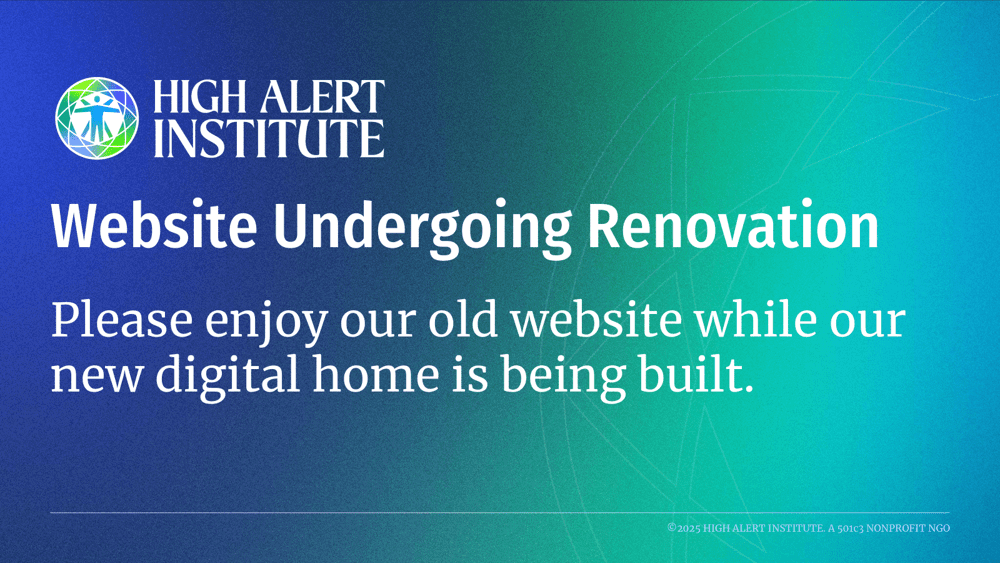High Alert Institute
Is Your Business Environment Ready for the Health Effects of Climate Change?

Is your business environment ready for climate change? Whether you agree or disagree with the thesis of human contribution to climate change, there is no arguing with the fact that recent years have seen record high temperatures and record low temperatures across the country and the globe.
Unprecedented fires in Australia and the Amazon rain forest, as well as record rainfall across Europe and the North American coasts are yet more proof that the Earth’s climate is shifting as it has many times in its 4.5 billion year history. The World Health Organization (WHO) as well as the CDC here in the United States have identified environmental heat exposure as an evolving threat at home and at work.
As outdoor temperatures swing through ever greater extremes of hot and cold, employees will spend more and more time indoors. Employees working in confined quarters are more exposed to illness and disease and contribute more to poor indoor air quality. If your business isn’t prepared to protect your most valuable asset (your employees) from illness, it could cost you a lot of money in the coming years. Fortunately, there are things business owners can do to help prevent financial losses.
Offer a Health Plan and Flu Vaccinations to Reduce Financial Losses
Certainly, employee health plans are not inexpensive – but have you considered how much money sick employees cost a company?
According to the workforce solution company Circadian, for each hourly employee, the cost of absenteeism due to illness = $3,600/year and $2,650/year for salaried employees. This includes wages to ill staff, wages paid to temp workers, and lost revenue due to absent employees and the disruption of business. (This information was published in Forbes magazine.)
Some estimates are less costly. Kaiser Permanente (K-P), a nationwide managed care consortium, reports the cost of absenteeism due to illness as $1,685/employee/year. But even at the lower K-P number, a business with only five employees still loses over $8,000 per year due to absenteeism.
Regardless of which figures you wish to believe, the point is: When employees are out sick, it costs businesses money. So, what to do?
Flu vaccinations are an inexpensive way of keeping employees healthier during winter months. (This is the heart of flu season when people typically spend more time indoors and are thus exposed to more illness).
Employers can:
* Require flu shots and pay for them
* Provide paid sick leave only employee had a flu shot (this is very common)
* Incorporate flu shots into healthcare coverage or an employee health program
Employers that provide and encourage flu shots receive:
* Less absenteeism
* More annual revenue
* Healthier employees
* Healthier clients (due to herd immunity)
* Community prestige for promoting public health
As noted earlier, the cost of absenteeism due to illnesses runs well into the thousands for employers each year, so flu shots offer a great return on investment.
When should employees be vaccinated? That depends. Some get a flu shot as early as August or September, but will need a second flu shot in February or March due to the long flu season.
Most receive their flu shot in October or early November, with the shot lasting until the end of a typical flu season (usually late February or early March). However, even a late flu shot (after the first week of November) provides protection for three or more months as the flu season builds in December and January.
Optimize IAQ to Reduce Environmentally Induced Stress
Indoor Air Quality (IAQ) is vital because contaminants such as radon, volatile organic compounds (VOCs), and other pollutants can build up indoors, leading to potentially serious health problems. Poor air quality increases blood pressure, risk of fatal heart attack and stroke by increasing the body’s stress response (also known as “Fight or Flight” response). By simply using a SMART ventilation controller to optimize air quality, you can reduce your stress level and the stress level of your employees by up to 14%. This is not a seasonal need and will be especially important during the extreme temperature months of the summer and winter when many of us will spend more time indoors.
Optimize IAQ by changing your building’s air filters regularly. At least every three months is recommended.
And don’t overlook the time many employees also spend in cars. If you have fleet vehicles, make sure the cabin filters are also changed on a regular basis. (A cabin filter is the vehicular equivalent of an indoor air filter in your company’s building.)
Improve Workplace Safety by Controlling Indoor Temperatures, but Do It Economically
Rising global temperatures have been demonstrated to not only increase stress levels, but also to increase the rates of aggression, bullying, verbal abuse and even workplace violence. Studies in several urban areas found that for every 2 degree rise in average yearly temperature, the rates of homicides, assaults and suicides rose by 3%. Interestingly, these increases were mitigated by indoor environmental temperature and humidity control. The problem for many businesses is that as global temperatures rise, the cost of cooling indoor spaces will rise as well. A SMART ventilation controller can save businesses up to 30% on their heating and cooling costs by using outdoor air to heat or cool the indoor space when outdoor temperature and humidity are appropriate for the task.
Summary
When one considers the high cost that absenteeism due to illness has on a business’s bottom line, offering health plans, encouraging flu shots, ensuring IAQ (through SMART ventilation controllers) and economically controlling indoor temperatures, are investments that will reap dividends. Is your business ready?
High Alert Institute
4800 Ben Hill Trail
Lake Wales, FL 33898
Office: 863.696.8090
FAX: 407.434.0804
EIN: 27-5078437
Info@HighAlertInstitute.org
Privacy Policy
Cookie Policy
Terms of Use
Disclaimers
Get Your Data
Shipping Policy
Message Us
Transparency
Registrations
Do Not Sell Info
Return Policy
A COPY OF THE OFFICIAL REGISTRATION AND FINANCIAL INFORMATION MAY BE OBTAINED FROM THE DIVISION OF CONSUMER SERVICES BY CALLING TOLL-FREE, WITHIN THE STATE, 1-800-435-7352 (800-HELP-FLA), OR VISITING www.FloridaConsumerHelp.com. REGISTRATION DOES NOT IMPLY ENDORSEMENT, APPROVAL, OR RECOMMENDATION BY THE STATE. Florida Registration #CH68959
REGISTRATION WITH A STATE AGENCY DOES NOT CONSTITUTE OR IMPLY ENDORSEMENT, APPROVAL OR RECOMMENDATION BY THAT STATE.










